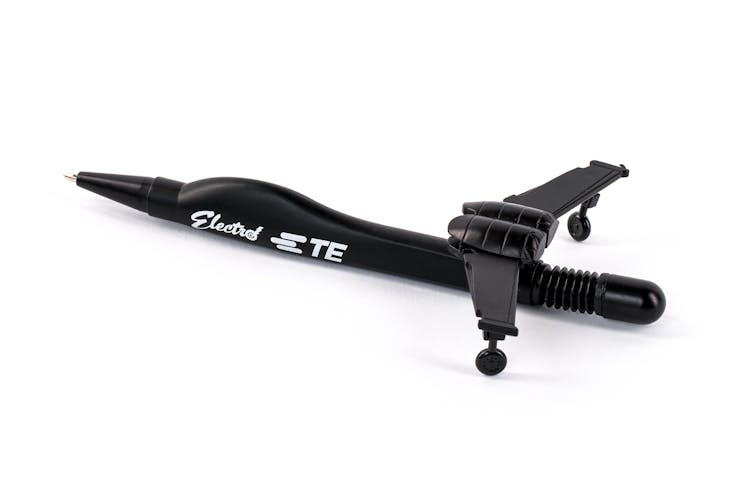One of the world’s largest arms fairs, Defence and Security Exhibition International (DSEI), takes place every two years at the ExCeL centre, a vast exhibition space in London Docklands. The venue usually hosts food, cosmetics and car events, but DSEI is a trade show for weapons.
Instead of consumer products, “combat-tested” drones hang from the ceiling, tanks are parked on the carpet, and “battle-proven” missiles are suspended over mock mountain ranges.
Screens project spectacular explosions with filmic music. Sales staff circulate with wine, beer and toy fighter jets. Executives forge alliances over burgundy and steak. And reps hand out glossy carrier bags filled with sweets and catalogues giving weapon specifications.
The arms industry is justified as necessary for defence. However, the experience of the fair suggests that it has an additional purpose. Here, missiles are treated as global commodities, and warring regimes as clients and business partners. The fair gives an insight into how arms sales to Israel can continue despite the horrific bombardment of Gaza.
A grenade rep sat at her stand. Jill Gibbon, CC BY-NC-ND
At the end of the cold war, the arms industry was restructured as part of the wider processes of globalisation. Arms companies merged into multinationals, establishing factories and subsidiaries around the world and building global markets. Weapons systems became joint ventures produced by several companies for international sales.
Arms fairs emerged in the 1990s as networking venues for this globalised weapons industry. DSEI describes itself as “a gilt-edged opportunity to reach key personnel – some chequebook ready” from around the globe. However, it is not open to everyone. Arms fairs are secretive events, closed to the public. When DSEI is on, ExCel is circled by police, security guards and riot fences.
I’m an artist and visit DSEI as a play on official war art, a tradition where artists are commissioned to draw in war zones. My aim is to draw what official war art leaves out – the role of UK and US industry in global conflict.
I’ve visited DSEI under a number of guises, including as a security consultant wearing a suit and paste pearls. Over the years, I’ve learned to act the part, strolling up and down the aisles viewing displays like a prospective client.
Inside an arms fair
The latest DSEI, which took place in September 2023, was particularly busy with more than 1,500 exhibitors, 36 international pavilions, and dignitaries and delegations from nearly 100 countries in attendance. Guests included regimes currently involved in wars, human rights abuses and repression. Bahrain, Egypt, Indonesia, Israel and Saudi Arabia were all there.
Saudi Arabia provides perhaps the best example of the problem with the DSEI admissions policy. According to research by Oxfam, the Saudi-led coalition in Yemen used US and UK-made weapons to kill 87 civilians and wound 136 people in just one year of war between January 2021 and February 2022. US and UK-made fighter jets were used in a further 13 airstrikes on hospitals and clinics.
In response, a spokesperson for the UK Department for International Trade said: “We consider all our export applications thoroughly against a strict risk assessment framework and keep all licences under careful and continual review as standard.”
In 2019, a missile hit a school bus in a Saudi-led airstrike on Yemen, killing 51 civilians including 40 children. It was established that the weapon was made by Lockheed Martin, one of the top US defence contractors.
The Arms Trade Treaty, which entered into force in 2014, prohibits selling weapons for attacks on civilians. Yet Saudi Arabia was welcome at DSEI in 2023.
Two men in discussion at DSEI. Jill Gibbon, CC BY-NC-ND
Exhibitors also come from around the world. Israel has a dramatic pavilion dominated by racks of missiles produced by leading Israeli defence technology companies, Rafael and IAI.
Showing how the lines between countries blur, Elbit Systems UK is nestled within the Israel stand with a display of military drones. Names like Skylark, Sky Strike, Bird of Prey and Thor sanitise the lethal hardware with references to nature and mythology.
Next to this, UVision, another Israeli defence company, shows Hero loitering weapons. These are suicide drones that can fly to an area and hover for extended periods while waiting for a target to destroy. Sales reps offer fresh fruit and chocolates embossed with the company logo and a flying drone.
The world’s largest exporter of weapons, the US, has the most expansive pavilion. One stall has calendars with a young woman posed on the front cover, leaning towards the viewer on a weapons mount. Other stalls offer toys and pretzels, alongside military equipment.
At DSEI in 2021, the US-Swiss company TE Connectivity gave out pens that transform into toy military drones. TE makes electrical components for the aerospace industry and is included in a list of the foreign companies that have been identified in Russian weapons.
TE Connectivity handed out pens that transform into toy military drones. Ricky Adam, CC BY-NC-SA
Global weapons industry
Multinational arms corporations hover between nationally sponsored pavilions, demonstrating their global allegiances. BAE Systems has a multi-level stand spanning two aisles.
It shows a telescoped armament system, an all-terrain tracked vehicle, drones and a submarine, interspersed with arrangements of flowers and expressionless security guards, who stand at regular intervals observing the crowds. Illuminated stairs give access to the higher levels of the stand, but without a VIP pass, I am turned away.
BAE Systems is a major partner in the F-35 fighter jet, a complex and expensive weapons system that involves many companies and countries. According to the prime contractor, Lockheed Martin, the UK industry will supply 15% of every F-35 produced. Danish company Terma is also involved and gives out blue jet-shaped badges to assert its contribution.
Israel was the first country to buy the F-35 through the US government’s foreign military sales process, receiving the first jets in 2016. And in February 2024, Lockheed Martin said Israel plans to buy a third squadron of F-35s.
In one discrete corner of the fair, there is a small medical section with equipment for military emergencies. Here, in the shadow of missiles and tanks, there is a pile of anatomically correct human hearts, offered as stress toys.
In response to this article, a TE spokesperson said:
TE Connectivity complies with all export controls and sanctions that apply to its business globally and has fully complied with all sanctions imposed on Russia following the Russian invasion of Ukraine. Additionally, TE has not shipped any product from any TE location to Russia since the sanctions were imposed, beginning in March 2022. TE is firmly committed to its policy of no direct or indirect shipments of its products to Russia and will continue to communicate this policy with its distribution partners.
Elbit UK was contacted for a comment on the issues raised in this article, but had not provided any by the time of publication.



 Alphabet’s Massive AI Spending Surge Signals Confidence in Google’s Growth Engine
Alphabet’s Massive AI Spending Surge Signals Confidence in Google’s Growth Engine  Baidu Approves $5 Billion Share Buyback and Plans First-Ever Dividend in 2026
Baidu Approves $5 Billion Share Buyback and Plans First-Ever Dividend in 2026  FDA Targets Hims & Hers Over $49 Weight-Loss Pill, Raising Legal and Safety Concerns
FDA Targets Hims & Hers Over $49 Weight-Loss Pill, Raising Legal and Safety Concerns  Missouri Judge Dismisses Lawsuit Challenging Starbucks’ Diversity and Inclusion Policies
Missouri Judge Dismisses Lawsuit Challenging Starbucks’ Diversity and Inclusion Policies  Anta Sports Expands Global Footprint With Strategic Puma Stake
Anta Sports Expands Global Footprint With Strategic Puma Stake  Kroger Set to Name Former Walmart Executive Greg Foran as Next CEO
Kroger Set to Name Former Walmart Executive Greg Foran as Next CEO  Rio Tinto Shares Hit Record High After Ending Glencore Merger Talks
Rio Tinto Shares Hit Record High After Ending Glencore Merger Talks  American Airlines CEO to Meet Pilots Union Amid Storm Response and Financial Concerns
American Airlines CEO to Meet Pilots Union Amid Storm Response and Financial Concerns  CK Hutchison Launches Arbitration After Panama Court Revokes Canal Port Licences
CK Hutchison Launches Arbitration After Panama Court Revokes Canal Port Licences 



































